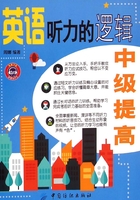
Part 3 练就超级听力耳,千丝万缕中听出关键信息
Unit 3 攻克情景对话
完全掌握了英语听力中常见的长句、难句后,并不意味着听力就有了本质的提高。听力的提高源于大量的实践,必须把已经掌握到的听音基础运用到实际生活中,这样你的听力实践经验才能得到提高,听力水平也才能进步。
情景对话模拟了实际生活中的英语会话,是各种听力考试中的经典题型,也是我们的听音能力在实践中的“牛刀小试”。情景对话的特点是话题范围较小,往往“就事论事”地谈论一个大家都熟悉的话题,如就餐、购物等。在听完对话双方的谈话后,根据说话人“字里行间”的“蛛丝马迹”做出推理和判断并回答问题。很显然,这种题目有助于考察听力水平,也是最佳的听力训练材料。
情景对话题目的解题技巧是:首先仔细阅读题干和答案,然后在听音时尽量注意抓住大意(适当的时候也可以做简单的笔记,记下重要的信息),然后做出判断并回答问题。
本书精选了各种听力考试中经常出现的20个话题的情景对话和相关练习,它们是真正的精华,值得你付出最大的努力,现在就用你的热情完成这些练习吧!
Section 1 Makinga Call 打电话
打电话是我们在生活中常遇到的情况。无论是在家里还是在办公室,学会正确的电话用语都是必要的。同学们从初中起就接触到如何打电话,我们在这里作一个归纳。
电话用语常有打电话、接听电话、电话留言、记录电话内容等。考试时,要格外留意电话号码和通话内容。先学习一下打电话时常用的词汇、短语和句式表达法。
常用词汇
extension number 分机号
answer the phone 接电话
leave a message for 给……留言
cut off 切断
overseas call 国际长途
long-distance call 长途电话
hold on/hang on 等一下
operator [' ɒpəreɪtə] n. 接线员
on the wire/line 听电话
call back 回电话
mobile phone 手机
hold the line 别挂
call box 公用电话亭
make a call 打电话
get sb. through 为某人接通电话
get off/hang up the phone 挂断
常用句型
Who is it? 你是哪位?
This is …speaking. 我是……。
Hello. This is … May I talk... to ? 喂,我是……。我可以和……通话吗?
Sorry, you' ve got the wrong number. 对不起,你打错电话了。
Can I put you through to his secretary? 我给你接他的秘书好吗?
Can I take a message ? 需要留个口信吗?
I called to tell/ask ... 我打电话来是要告诉/询问……
Please tell him to call back. My number is …请叫他回电话,我的号码是……
The line is busy/engaged. 占线。
Your connection is bad. 听不清。
You are through now. Please go ahead. 电话已接通,请讲。
There is no person by that name here. 这儿没有叫这个名字的人。
The number you dialed is power off. 你拨的号码已关机。
You can get him at 36307685. 你可以拨打36307685找他。
疯狂操练
Task 1 Now listen to a conversation for the first time and answer questions 1~2.
1. What does Bob call Nancy for?
A) To invite her to go to a concert.
B) To ask her to see a friend together.
C) To ask her to go to the theatre together.
D) To invite her to watch a tennis match.
2. When will Nancy go out with Bob?
A) This evening.
B) Tomorrow night.
C) Next Saturday.
D) Next Sunday.
Task 2 Now listen to the conversation twice and fill in the blanks numbered 1~5 with the words or phrases you have just heard.
Bob: Hello, Nancy. This is Bob. How are you?
Nancy: Fine, thank you. I' m 1) __________though. You know, I' m trying to 2)__________in my new flat.
Bob: Oh, I see. Well, I 3) __________if you' d like to go to a concert tomorrow night. I think it' ll be good, and if I remember correctly, you 4)__________you like country music.
Nancy: Yes, that' s right. It' s 5)____________________to ask, Bob.
听力原文
Bob: Hello, Nancy. This is Bob. How are you?
Nancy: Fine, thank you. I' m a bit too busy though. You know, I' m trying to put everything in order in my new flat.
Bob: Oh, I see. Well, I was wondering if you' d like to go to a concert tomorrow night. I think it' ll be good, and if I remember correctly, you did say you like country music.
Nancy: Yes, that' s right, I do. It' s so nice of you to ask, Bob. But I don' t think I can. Margaret has already asked me to see a friend, and then we' ll go to the theatre together. In fact, she' s getting the tickets this evening.
Bob: Oh, well, never mind. What about next weekend? This concert is still on then, I think, if you' re free next Saturday.
Nancy: Oh, I' d like to very much, but what time exactly?
Bob: It starts at 7:30, I think.
Nancy: Oh, good. That' ll be fine. The tennis match will be over by 5 o' clock, I' m sure.
Bob: Good. I' ll call you again when I get the tickets.
Nancy: Sure. Bye for now.
Keys:
Task 1 1. A 2. C
Task 2 1. a bit too busy
2. put everything in order
3. was wondering
4. did say
5. so nice of you
Tips:
1.打电话时,可首先自报家门,如说出你的姓名,或公司的名称,或报你的电话号码,以便对方确认信息。对于数字0,最好说成“zero”,而不是字母“o”,以免引起歧义。如果拨错了号码,说一句“I' m sorry, I have the wrong number.”即可,而回答“That is quite all right.”足矣。
2. 打电话时,注意使用口头语而非书面语。另外,由于打电话时看不到对方的表情手势(视频电话除外),因此,要格外注意措辞的礼貌。例如,我们通常会说“May I speak to ..., please? ”或“Could you put me through to ...”,而非“Is ...there/in? ”(除非特别熟悉)。